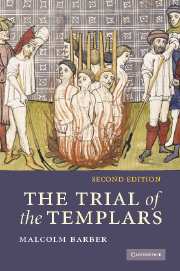Book contents
- Frontmatter
- Dedication
- Contents
- Preface to the Second Edition
- Preface to the First Edition
- Abbreviations
- Introduction
- 1 The Participants
- 2 The Arrests
- 3 The Papal Intervention
- 4 The Papal and Episcopal Inquiries
- 5 The Defence of the Order
- 6 The End of Resistance
- 7 The Charges
- 8 The Trial in Other Countries
- 9 The Suppression
- 10 Conclusion
- Chronology of the Trial of the Templars
- Recent Historiography on the Dissolution of the Temple
- Notes
- Bibliography
- Index
8 - The Trial in Other Countries
Published online by Cambridge University Press: 05 July 2015
- Frontmatter
- Dedication
- Contents
- Preface to the Second Edition
- Preface to the First Edition
- Abbreviations
- Introduction
- 1 The Participants
- 2 The Arrests
- 3 The Papal Intervention
- 4 The Papal and Episcopal Inquiries
- 5 The Defence of the Order
- 6 The End of Resistance
- 7 The Charges
- 8 The Trial in Other Countries
- 9 The Suppression
- 10 Conclusion
- Chronology of the Trial of the Templars
- Recent Historiography on the Dissolution of the Temple
- Notes
- Bibliography
- Index
Summary
When the Templars in France were suddenly arrested on 13 October 1307, Edward II of England had been king for only four months. He was, as yet, uncrowned. He was young and inexperienced, and all his life he had been overshadowed by the towering personality of his father. Despite his many successes Edward I had left his heir an inheritance full of stresses and strains. Wars with Scotland and France and a lavish programme of castle building had put the crown heavily in debt, yet had failed to solve the problems which lay behind the wars. Discontent among the baronage, which had been growing during the later years of Edward I's reign, was now very near the surface. On the face of it, it might be expected that when Edward II received news of the arrest of the Templars, he would have seized the opportunity to score an easy success. The Templars' lands in England were by no means as extensive as those in France, but they were still a considerable prize, and their seizure might have helped alleviate immediate financial problems without alienating any important sectional interest. The example of the experienced Philip IV, who, if he had failed to crown all his ventures with success, had for more than twenty years kept the authority of the monarchy intact by such expedients, lay before him. Moreover, opposition from the Templars was likely to be minimal, for although the Order in England was rich in possessions, it was comparatively small in terms of personnel.
However, on 30 October he had told Philip IV that he could not give ‘easy credence’ to the accusations, but since the charges apparently originated in Guienne, he would write to William of Dène, his seneschal in Agen, summoning him to come to his presence to give his account. The outcome was that Edward remained unconvinced of the veracity of the charges and instead of arresting the Templars, on 4 December he sent out duplicate letters to the kings of Portugal, Castile, Aragon and Naples, strenuously defending the Order.
- Type
- Chapter
- Information
- The Trial of the Templars , pp. 217 - 258Publisher: Cambridge University PressPrint publication year: 2006
- 1
- Cited by



